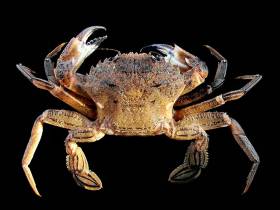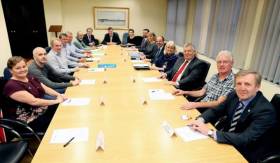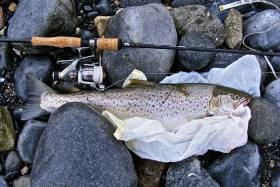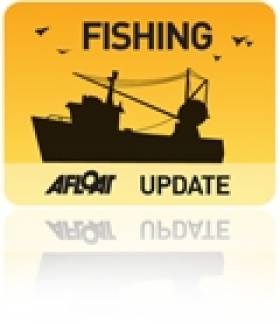Displaying items by tag: NIFF
Marine Minister Announces Public Consultation on Herring Stock Management in Northwest
Marine Minister Charlie McConalogue is launching a consultation process on a review of the 2012 Herring Management Policy.
It will focus on the quantity of herring set aside from the southern North-West herring stock (Herring 6A South) for smaller/inshore fishing vessels, which is currently 5% of the quota for vessels under 20m in length that did not have a qualifying track record for the fishery.
The minister received a request from the chairs of the National Inshore Fisheries Forum (NIFF) and North Regional Inshore Fisheries Forum (RIFF) for a review of the 6A South Herring Policy of 2012, in relation to inshore vessels.
“I have carefully considered the request from the NIFF and RIFF and I am satisfied that there are sufficient changed circumstances to justify a limited review of the 2012 policy,” the minister said.
“Inshore fishing families are the linchpin of rural coastal communities and it is important that we continue to seek ways to improve fishing opportunities for this sector.”
Minister McConalogue continued: “When the 5% provision was set in the 2012 Herring Management Policy, it reflected an expectation that Ireland would have a reasonable quota available to it, as had been the case in the years prior to the setting of the policy.
"I am open to considering amendments to this part of the policy so that inshore vessels have a reasonable allocation available to them when the quota available is low, taking into account that this stock is important for our inshore vessels.”
Adding that Ireland is “moving into a better place wit this fishery” after years of closure due to its “poor state”, the minister said: “The scientific advice on the state of the stock is now positive and we can look forward to a good fishery for the fishing fleet, both for inshore and offshore vessels.
"This demonstrates clearly that taking strong conservation measures, when necessary, rebuilds fish stocks. I appreciate fully the strong support given by our fishers for these conservation measures even though they were deprived of a commercial fishery for six years.”
Minister McConalogue said he will shortly be inviting stakeholders and in particular those involved in the fishery over recent years to submit their views.
“To assist consideration, I asked my department to prepare a consultation paper setting out the background and giving possible options. I look forward to good engagement from stakeholders including any alternative proposals put forward during the consultation,” he said.
"Following the consultation, I will consider all the issues involved and make a decision on any justified amendment to the 2012 policy including any new arrangement in the interim or on a longer-term basis,” he added.
Marine Minister Confirms Opening of New Fishery at Virtual Meeting With Inshore Sector
Marine Minister Charlie McConalogue met virtually on Friday (16 December) with the members of the National Inshore Fisheries Forum (NIFF) to discuss a range of topics, including the reopening of the spurdog fishery after nearly 12 years.
Minister McConalogue welcomed those representatives from the six Regional Inshore Fisheries Forums who were attending the NIFF for the first time, noting that the forum is a very valuable mechanism for the views of inshore fishers to be represented.
“I am delighted with the level of commitment that people have shown in engaging with the forums because, without this commitment, this initiative would not have emerged as the influential voice for the inshore sector that it has become,” he said.
Issues discussed included the request from the forum for the minister to consider financial support mechanisms to enable the sector to remain viable in the current challenging environment.
The minister also listened to the forum members’ views and proposals in relation to developments in the hook-and-line mackerel fishery and North West herring policy.
A range of other topics discussed included the minister’s initiative to establish a Brown Crab Working Group in order to review the current arrangements in place for that fishery and to examine management options likely to support the sustainability of brown crab stocks in Ireland.
The minister has requested that the group be made up of representatives from industry bodies and stakeholders and supported by Bord Iascaigh Mhara, the Marine Institute, Sea-Fisheries Protection Authority and officials from the minister’s department.
“The sustainability of the brown crab fishery is of key importance to the inshore sector,” he said. “My scientific advisors, the Marine Institute, [have] recommended that action be taken to support brown crab stocks. I would expect the working group to provide me with recommendations for proposed management measures for the fishery.”
Minister McConalogue also welcomed new fishing opportunities with a quota of 1,874 tonnes for spurdog set for Irish fishers in 2023.
The species is a long-lived, slow-growing and late-maturing species and is, therefore, particularly vulnerable to over-fishing. The spurdog stock was subject to high catches for more than four decades, and fisheries were not managed during this time. The stock is now recovering and the scientific advice from the International Council for the Exploration of the Seas (ICES) recommended setting a quota for 2023 to allow for reopening of the fishery.
“The spurdog fishery has been closed since 2011 and I am pleased that this tough action has allowed the stock to rebuild,” the minister said. “It will be important that we manage the fish stock going forward to prevent overfishing this stock. When we reopen the fishery, measures will be put in place to require that larger spurdog are avoided to allow them to breed and reproduce.”
Minister McConalogue added: “I have listened to the views of the inshore sector, including at today’s National Inshore Fisheries Forum, and this is an important new fishery for them. It will, therefore, be important that we put in place management measures that focus on the inshore fleet.
“In advance we need to build up knowledge of markets and work with processors who want to get involved. I am asking BIM to explore all possibilities before opening a fishery in order to deliver best returns for fishers.”
The meeting included contributions from the Marine Institute and Bord Iascaigh Mhara. The minister thanked all those attending for their constructive engagement throughout the meeting.
Concerns Over Supertrawlers In Inshore Waters Discussed At National Fisheries Forum
#Fishing - Marine Minister Michael Creed hosted the 13th meeting of the National Inshore Fisheries Forum (NIFF) yesterday, Thursday 22 February.
The Inshore Fisheries Forum structures, which include NIFF and six Regional Inshore Fisheries Forums (RIFFs), were established in 2014 to foster stakeholder-led development of proposals for the inshore fishing sector.
Minister Creed announced that he expects to publish a consultation paper to review the options for more restricted access for large fishing vessels fishing by means of trawls inside Ireland’s six-nautical-mile zone.
This issue has been the subject of scientific and economic reports by the Marine Institute and Bord Iascaigh Mhara (BIM) and some preliminary engagement with fisheries representative groups, including the NIFF.
“I recognise that this issue has been raised by the National Inshore Fisheries Forum since its inception and that there are concerns about the relatively open access for large trawlers to our inshore areas,” said the minister. “The inshore fisheries sector, including coastal and island fisherman, is dependent on inshore fish stocks.
“I am open to looking at the benefits, from an economic perspective for the inshore fleet of introducing some restrictions on large vessels. This could also have a positive biological impact on fish stocks and biodiversity.
“I am awaiting a paper from the department setting out the issues, possible benefits and options to inform my consideration of the issues and possible impacts, both positive and negative. I am planning to undertake a public consultation on the options and to hear and understand the diverse interests of stakeholders to ensure that any new measures introduced are fair and balanced.”
Minister Creed and the NIFF also discussed feedback on recent public consultations on conservation measures for brown crab and razor clams.
The consultations were held following recommendations from the NIFF and the measures are under consideration for their potential benefits to protect fish stocks in the long term. The minister also discussed the impact of Brexit on the fishing sector.
In addition, the NIFF updated the minister on its progress in preparing a sector-specific strategy for the first time.
Supported by BIM and a steering group including the Department of Agriculture, Food and the Marine; the Marine Institute; and the SFPA, consultants are facilitating the preparation of an Inshore Fisheries Strategy on behalf of the NIFF.
Steps taken to date include preliminary consultation, a workshop with the Regional Inshore Fisheries Forums and feedback sessions with the Steering Group.
Minister Creed welcomed the news that the next expected output is a draft strategy document for public consultation.
Marine Minister Introduces Conservation Measures Proposed By National Inshore Fisheries Forum
#Fishing - Marine Minister Michael Creed signed into law conservation measures concerning Irish velvet crab stocks as he hosted the 12th meeting of the National Inshore Fisheries Forum (NIFF) today, Wednesday 27 September.
The Inshore Fisheries Forum structures, which include the NIFF and six Regional Inshore Fisheries Forums (RIFFs), were established in 2014 to foster stakeholder-led development of proposals for the inshore fishing sector.
As well as moved to protect Irish velvet crab, the minister also introduced measures to regulate fishing activities affecting Natura 2000 sites at Hook Head and the Saltee Islands.
Regulations signed by Minister Creed today will introduce a Minimum Conservation Reference Size (MCRS) of 65mm for velvet crab that will apply to Irish sea fishing boats from 1 January 2018.
This measure was initially developed by the West Regional Inshore Fisheries Forum (RIFF) with advice from the Marine Institute. The proposal was brought to the minister last year by the NIFF, and a public consultation on the measure was held at the end of 2016.
Velvet crab are fished all year, but mainly in the March to October period, and they are predominantly a by-catch in the lobster fishery. Landings of velvet crab into Ireland were 406 tonnes in 2015, higher than any year since 2004, and were valued at just under €808,000. Over 80% of velvet crabs are landed by vessels less than 10 metres in length.
Additionally, a Fisheries Natura Declaration signed by Minister Creed today will restrict fishing using dredge and trawling gear for scallop fishing to protect certain sensitive habitats in Natura 2000 conservation sites off the southeast coast of Wexford from 30 November.
The Natura 2000 sites include the Hook Head and Saltee Islands SACs (Special Areas of Conservation). The declaration also sets down monitoring and notification requirements for boats fishing using dredge and trawling gear within these habitats.
These gear and monitoring measures were developed through industry members working with the Marine Institute and Bord Iascaigh Mhara (BIM) to address risks to sensitive habitats in the Hook Head and Saltee Islands SACs. The risks were identified by the Marine Institute in a 2014 risk assessment report of sea-fishing activities in Natura 2000 sites in the Irish Sea.
Industry members – including individual scallop fishermen, members of the Southeast RIFF and representatives of the Irish South and East Fish Producers Organisation (ISEFPO) – met with the Marine Institute and BIM through 2015 and 2016 to develop risk mitigation proposals for the fishery. A public consultation on the resulting Mitigation Response Plan was carried out in 2016.
These measures are being introduced following full consultation with the Inshore Fisheries Forum structures.
“Heading into their third year, the forums have taken a lead in tackling conservation issues and changing practices with a view to long-term sustainability,” said Minister Creed. “I welcome the support these measures have received from the Forums which reflects the mature approach this sector is taking in dealing with its own challenges.”
Minister Creed and the NIFF discussed the implementation of the new measures and the status of other measures under review for important stocks such as lobster, brown crab and razor clams.
The minister also discussed the impact of Brexit on the fishing sector and the UK’s intention to withdraw from the London Fisheries Convention, which governs access to waters inside the 12-mile limit.
Commenting on issues arising for the sector from Brexit, Minister Creed noted: “While the implications of Brexit are far from clear at this point in time, I will continue to highlight Irish fisheries concerns on the EU agenda and work with other impacted EU member states and the Barnier team to ensure that fisheries are not isolated in the overall negotiations on a new EU/UK relationship.”
New Website For National Inshore Fisheries Forums
#Fishing - A new website for the National Inshore Fisheries Forums (NIFF) was launched by Marine Minister Michael Creed yesterday (Tuesday 25 October).
“Getting inshore fishing communities involved in decision-making is the key aim of the forum initiative,” said the minister, who added that the website “is a vital tool both to make information available and also to foster interaction and discussion.
“I hope that it will become a regular port of call for all interested in developing a sustainable future for this sector.”
Minister Creed also thanked Bord Iascaigh Mhara and the forum delegates for their contributions to the website at www.inshoreforums.ie, launched at the eighth meeting of the NIFF since it was established in 2014.
Budget 2017’s introduction of the Fisher’s Tax Credit (based on the seafarer’s allowance model) and changes to the Fish Assist Scheme were highlighted as important income support mechanisms for inshore fishing communities.
The inshore sector — comprising fishing boats of less than 12 metres in overall length — makes up more than 80% of the fishing fleet, and is predominately active within six nautical miles of the Irish shore.
Minister Creed acknowledged the role of the NIFF and others in the fishing industry in advocating for income support.
“Maintaining jobs and attracting new entrants have been identified by our stakeholders as a key challenge for our fishing industry, including the inshore sector,” he said.
“This annual tax credit specifically for fishermen of €1,270, which mirrors the value of the Seafarer’s allowance, is important recognition for their contribution to Ireland’s Blue Economy.”
Yesterday’s NIFF meeting also tabled proposals to revise the conservation measures for lobster, and to introduce technical conservation measures for the velvet crab fishery.
#Angling - Inland Fisheries Ireland (IFI) has announced the establishment of the second National Inland Fisheries Forum (NIFF).
Angling federations, groups and individuals are requested to nominate candidates for membership on the forum, established under the Inland Fisheries Act 2010 to provide a mechanism to recognise the important contribution of a wide range of stakeholders to the policies of IFI and their inputs into the sector generally.
During its first term, a specific objective of the NIFF was also to ensure that this contribution was not lost when the Regional Fisheries Boards were abolished as part of the process of establishing IFI.
The initial cycle of the NIFF was launched in October 2011 and concluded its three-year term in 2014. Following a comprehensive review of its first cycle, its structure and function has been modified to enable more effective operations.
In accordance with the provision in the 2010 Act, the minister has had an input into this review process and has signed off on the revised structure.
To recognise the special role of angling stakeholders, each of the main angling organisations has been requested to nominate two of their members to represent their interests for the duration of the second cycle of the NIFF. It is anticipated that these nominees will then be appointed to the forum by the minister.
The process of selecting the remaining members of the new forum will be managed by the Public Appointment Service (PAS) with the support of IFI. The forum shall consist of not more than 60 members.
Commenting on the revised process for the appointment of members to the Forum, IFI chief executive Dr Ciaran Byrne said: “The restructured forum provides an important opportunity for all stakeholders to contribute to the development of policies in respect of the Irish inland fisheries resource.
"The combined forum membership is expected to comprise people with knowledge in the areas of recreational fisheries, environmental organisations, business, fishery owners, tourism and marketing, agriculture, aquaculture, commercial fisheries [and] heritage.
"I am confident that membership will span all appropriate sectors and regions and will lead to improved input to inland fisheries policy and future development.”
The PAS has compiled an information booklet providing additional information on the recruitment process and the next cycle of the NIFF.
#Fishing - Marine Minister Simon Coveney announced on Tuesday (26 May) the introduction of national management measures for razor clams.
The minister brought forward the proposals at the third National Inshore Fisheries Forum (NIFF) meeting, where he announced the introduction of an outtake limit for fishing razor clams in the North Irish Sea of 700kg per vessel per week to take effect from Monday 1 June 2015.
Speaking about the new measures, Minister Coveney said: “At the second NIFF meeting in April, I stated that I would take steps to secure the sustainability of the razor clam fishery, and the new interim measures for the North Irish Sea are a first step in that process.
"I am also conscious that certainty about safe, high quality Irish seafood is important for consumers and for the marketplace. Accordingly, I have decided to introduce national measures to ensure Ireland can demonstrate its commitment to safe seafood.”
The new national measures include:
- Obligations to weigh and report all razor clam landings,
- A requirement to ensure fishing takes place only in shellfish production areas which have been classified for razor clams
- A requirement to fish in only one class of shellfish production area, from a seafood safety perspective, per day, and
- An obligation for vessels in Irish waters to carry GPS tracking equipment from 20 July.
The protection of Natura 2000 sites also featured on the agenda at Tuesday’s meeting, and the minister welcomed support from the NIFF to facilitate stakeholder engagement in preparing mitigation plans for sites with features at risk from certain fishing activities.
“There are features in a number of Natura 2000 sites which are particularly sensitive to certain fishing activities, and we must ensure that the integrity of these Special Areas of Conservation is protected," the minister said.
"Protecting the ecosystems of marine conservation sites preserves the quality of our marine environment and is another step towards harnessing our ocean wealth in a sustainable way.”
The NIFF has been set up to encourage inshore fishing communities to discuss their fishing issues and generate commonly-supported initiatives. Ciaran Quinn of the North West region is the first industry-led chair of the forum, and Eddie Moore of the South West region is the vice chair.
Lobster conservation measures and proposals to manage recreational pot fishing were among the other inshore policy issues discussed by the NIFF members at this week’s meeting.

































































